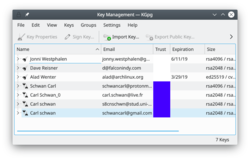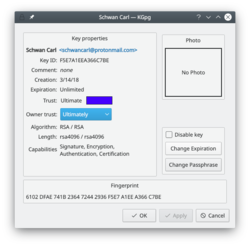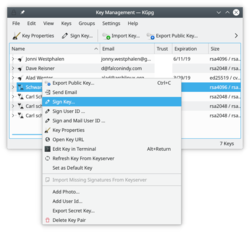KGpg/zh-cn: Difference between revisions
m Created page with 'Category:工具 (zh CN) Category:安全 (zh CN)' |
Updating to match new version of source page |
||
| (22 intermediate revisions by 2 users not shown) | |||
| Line 1: | Line 1: | ||
<languages /> | <languages /> | ||
__TOC__ | |||
{|style="text-align:center" | {|style="text-align:center" | ||
|[[Image:Kgpg-keymgr.png|250px]]|| ||'''KGpg 为gpg命令提供了图形界面''' | |[[Image:Kgpg-keymgr.png|250px]]|| ||'''KGpg 为gpg命令提供了图形界面''' | ||
| Line 8: | Line 9: | ||
'''GnuPG'''加密和解密你的邮件和选定的文件。完成这样的操作需要很多的命令选项。有了 '''KGpg''' 忧虑就可以消除了 - 你不再需要记住任何命令。'''KGpg'''帮你建立和管理你密钥,导入和导出密钥,查看密钥签名,信任等级和有效期。实际上差不多所有你需要做的事情'''KGpg'''都覆盖到了。同时也提供向导帮助你建立你的密钥。 | '''GnuPG'''加密和解密你的邮件和选定的文件。完成这样的操作需要很多的命令选项。有了 '''KGpg''' 忧虑就可以消除了 - 你不再需要记住任何命令。'''KGpg'''帮你建立和管理你密钥,导入和导出密钥,查看密钥签名,信任等级和有效期。实际上差不多所有你需要做的事情'''KGpg'''都覆盖到了。同时也提供向导帮助你建立你的密钥。 | ||
'''KGpg''' | '''KGpg''' 集成[[Special:myLanguage/Konqueror|Konqueror]] 和[[Special:myLanguage/Dolphin|Dolphin]]里, 这2个程序的右键关联菜单允许你选择签名和不签名情况下加密文件。 | ||
{| | {| | ||
|[[Image:Kgpg-props.png|thumb|250px|查看一个密钥的属性]]|| ||[[Image:Kgpg-options.png|thumb|250px|右击密钥查看选项]] | |[[Image:Kgpg-props.png|thumb|250px|查看一个密钥的属性]]|| ||[[Image:Kgpg-options.png|thumb|250px|右击密钥查看选项]] | ||
|} | |} | ||
== Extending the life of your keys == | |||
As you can see in the image above, you can extend the life of your keys using the <menuchoice>Change Expiration</menuchoice> button. Simply choose the new date from the popup calendar. To do this, however, you must have access to the private key and its pass-phrase. Without them you can do nothing. | |||
== Change your passphrase == | |||
Should you suspect your passphrase is compromised, you can change this also from the '''Key Properties''' dialogue. The <menuchoice>Change Passphrase</menuchoice> button is below <menuchoice>Change Expiration</menuchoice>. | |||
== Revoking a key == | |||
If you lose your private key or think it has been compromised in some way you need to revoke it. To reliably render a key unusable you need to revoke it. Revoking is done by adding a special revocation signature to the key. | |||
The revocation signature can be created together with the key. In this | |||
case it is stored in a separate file. This file can later be imported into | |||
the keyring and is then attached to the key rendering it unusable. | |||
{{Warning|1=Please note that to import this signature to the key no password is required. Therefore you should store this revokation signature in a safe place, usually one that is different from you key pair. It is a good advise to use a place that is detached from your computer, either copy it to an external storage device like an USB stick or print it out.}} | |||
If you have not created such a detached revocation on key creation you can | |||
create such a revocation signature at any time choosing <menuchoice>Your Key -> Revoke key</menuchoice>, optionally importing it to your keyring immediately. | |||
{{Note|1=The option to revoke a key has only been available in the context menu until KDE SC 4.7.1. Since then it has been moved to the key menu. }} | |||
<div class="mw-translate-fuzzy"> | |||
::{{Tip_(zh_CN)|如果你启动的 '''KGpg''' 是默认配置的话,它是会隐藏到系统托盘中。要是你启动后找不到该程序的窗口,请展开 [[Plasma|Plasma]] 的系统托盘找找。}} | |||
</div> | |||
{{Tip|1=If a contact has more than one key - perhaps some old keys in addition to the current one - and the wrong key is being used for encryption, find the old keys and reduced their Trust status to Not Trusted. They will remain available for decrypting old messages, but not used for new ones. }} | |||
<div class="mw-translate-fuzzy"> | |||
这份 ''[http://docs.kde.org/development/en/kdeutils/kgpg/index.html 完整的说明手册]'' 有助于你了解每个细节。 | |||
</div> | |||
<div class="mw-translate-fuzzy"> | |||
要是你没能力现实的验证联系人的身份,你应该读读''[http://docs.kde.org/development/en/kdeutils/kgpg/manage.html#keysigning 密钥签名部分]''了解本地签名的益处。 | |||
</div> | |||
== Tutorials == | |||
* [https://peertube.mastodon.host/videos/watch/bc82c21b-7526-44be-8efb-ede6edac51af Verify GPG signatures with KGpg inside Dolphin] (Source Peertube instance: peertube.mastodon.host) | |||
== More Information == | |||
* [[Special:myLanguage/Concepts/OpenPGP_For_Beginners|Explanation of OpenPGP concepts for beginners]] | |||
* [https://www.gnupg.org/documentation/howtos.en.html The base software: GnuPG] | |||
* [https://docs.kde.org/stable5/en/kdeutils/kgpg/index.html '''KGpg''' manual] | |||
[[Category:工具 | <div class="mw-translate-fuzzy"> | ||
[[Category:安全 | [[Category:工具/zh-cn]] | ||
[[Category:安全/zh-cn]] | |||
</div> | |||
Latest revision as of 11:15, 1 August 2019
 |
KGpg 为gpg命令提供了图形界面 |
GnuPG加密和解密你的邮件和选定的文件。完成这样的操作需要很多的命令选项。有了 KGpg 忧虑就可以消除了 - 你不再需要记住任何命令。KGpg帮你建立和管理你密钥,导入和导出密钥,查看密钥签名,信任等级和有效期。实际上差不多所有你需要做的事情KGpg都覆盖到了。同时也提供向导帮助你建立你的密钥。
KGpg 集成Konqueror 和Dolphin里, 这2个程序的右键关联菜单允许你选择签名和不签名情况下加密文件。
 |
 |
Extending the life of your keys
As you can see in the image above, you can extend the life of your keys using the button. Simply choose the new date from the popup calendar. To do this, however, you must have access to the private key and its pass-phrase. Without them you can do nothing.
Change your passphrase
Should you suspect your passphrase is compromised, you can change this also from the Key Properties dialogue. The button is below .
Revoking a key
If you lose your private key or think it has been compromised in some way you need to revoke it. To reliably render a key unusable you need to revoke it. Revoking is done by adding a special revocation signature to the key.
The revocation signature can be created together with the key. In this case it is stored in a separate file. This file can later be imported into the keyring and is then attached to the key rendering it unusable.
If you have not created such a detached revocation on key creation you can
create such a revocation signature at any time choosing , optionally importing it to your keyring immediately.
这份 完整的说明手册 有助于你了解每个细节。
要是你没能力现实的验证联系人的身份,你应该读读密钥签名部分了解本地签名的益处。
Tutorials
- Verify GPG signatures with KGpg inside Dolphin (Source Peertube instance: peertube.mastodon.host)



